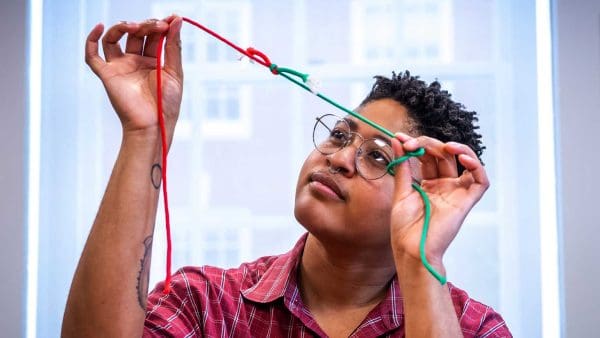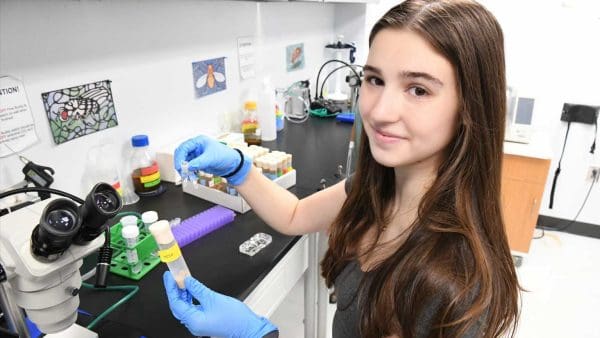
Robbie Kuang has long been fascinated by how the brain is affected by drugs in ways manifesting as altered physical behavior. Knowing right away upon coming to Johns Hopkins that she wanted to delve into the subject, Kuang declared as a neuroscience major and sought undergraduate research opportunities.
“With its emphasis on research, I knew Johns Hopkins would be a great place for me,” says Kuang, now in her junior year. “I’ve always been interested in how chemical compounds can interact with your brain cells and make you feel or act differently. Now I have the chance to study this concept.”
Connecting with researchers
Kuang’s curiosity led her to the Johns Hopkins Cannabis Science Laboratory, through which she connected with Catherine (Cassie) Moore, assistant professor of psychiatry and behavioral sciences in the School of Medicine. Under Moore’s mentorship, Kuang submitted a successful project proposal for a Provost’s Undergraduate Research Award (PURA).
The project broadly asks if cannabidiol (commonly known as CBD) could help people better cope with the harsh physical and psychological symptoms of withdrawal after long-term opioid use. These symptoms include anxiety, tremors, gastrointestinal pain, vomiting, diarrhea, and disturbed sleep. For a number of recovering users, the withdrawal symptoms prove too severe and result in relapses.
Kuang’s research is highly topical, seeing as CBD—a non-addictive, non-psychoactive compound derived from cannabis, or marijuana plants— has gained greater acceptance, while an opioid epidemic continues to rage across the country.
Effects of CBD on long-term symptoms
For the project, Kuang is working with animal models in Moore’s lab to explore two understudied elements in opioid use disorder research.
The first is protracted withdrawal, which continues even after the acute symptoms endured over the first few days ends.
“Acute is the most studied, but protracted symptoms can last for weeks or even months,” says Kuang. “We really wanted to take a deeper look at this and see if CBD can help with symptoms in the long run.”
The second element is that a lot of scientific research has historically been conducted with male subjects only, thus failing to account for potential sex-related differences. Accordingly, Kuang’s experiments involve both male and female animal models.
If the research bears out CBD’s effectiveness, the hope is that it could serve as an alternative or supplement to current medications for treating withdrawal and addiction. These mainline treatments are opioids themselves, such as methadone, or opioid antagonists, such as naltrexone, both of which can have unwanted side effects that reduce treatment compliance and thus overall patient outcomes.




